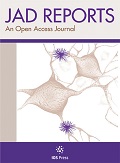Authors: Volloch, Vladimir | Rits-Volloch, Sophia
Article Type:
Other
Abstract:
With the Amyloid Cascade Hypothesis (ACH) largely discredited, the ACH2.0 theory of Alzheimer’s disease (AD) has been recently introduced. Within the framework of the ACH2.0, AD is triggered by amyloid-β protein precursor (AβPP)-derived intraneuronal Aβ (i Aβ) and is driven by i Aβ produced in the AβPP-independent pathway and retained intraneuronally. In this paradigm, the depletion of extracellular Aβ or suppression of Aβ production by AβPP proteolysis, the two sources of AβPP-derived i Aβ, would be futile in symptomatic AD, due to its reliance on i Aβ generated independently of AβPP, but effective in preventing AD and treating Aging-Associated
…Cognitive Decline (AACD) driven, in the ACH2.0 framework, by AβPP-derived i Aβ. The observed effect of lecanemab and donanemab, interpreted in the ACH2.0 perspective, supports this notion and mandates AD-preventive clinical trials. Such trials are currently in progress. They are likely, however, to fail or to yield deceptive results if conducted conventionally. The present study considers concepts of design of clinical trials of lecanemab, donanemab, or any other drug, targeting the influx of AβPP-derived i Aβ, in prevention of AD and treatment of AACD. It analyzes possible outcomes and explains why selection of high-risk asymptomatic participants seems reasonable but is not. It argues that outcomes of such AD preventive trials could be grossly misleading, discusses inevitable potential problems, and proposes feasible solutions. It advocates the initial evaluation of this type of drugs in clinical trials for treatment of AACD. Whereas AD protective trials of these drugs are potentially of an impractical length, AACD clinical trials are expected to yield unequivocal results within a relatively short duration. Moreover, success of the latter, in addition to its intrinsic value, would constitute a proof of concept for the former. Furthermore, this study introduces concepts of the active versus passive i Aβ depletion, contends that targeted degradation of i Aβ is the best therapeutic strategy for both prevention and treatment of AD and AACD, proposes potential i Aβ-degrading drugs, and describes their feasible and unambiguous evaluation in clinical trials.
Show more
Keywords: Aging-associated cognitive decline, Alzheimer’s disease, Amyloid Cascade Hypothesis 2.0 (ACH2.0), BACE1 and BACE2 activators, clinical trial design, donanemab, intraneuronal Aβ
, lecanemab, verubecestat
DOI: 10.3233/ADR-230037
Citation: Journal of Alzheimer's Disease Reports,
vol. 7, no. 1, pp. 921-955, 2023





